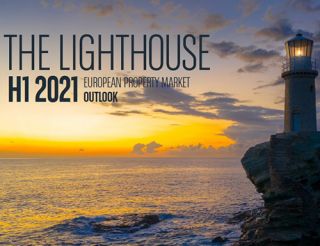Key findings from this edition of The Lighthouse
- The economic rebound is expected to be strong, with robust growth and inflation. Recovery will be supported by European government spending and central banks’ policies
- Real estate is attractively priced, making it an appealing investment option. With interest rates not expected to rise materially, there is room for further yield compression
- Logistics and healthcare are forecast to have the strongest opportunities, achieving solid rental growth, above-average yields and strong investor demand
- Whilst the office market has faced competition from home working, it is likely to remain resilient
- Whilst retail activity is still suffering, retail warehouses are proving to be an exception. This is due to low rents and cheap locations, which means that these Big Box assets are benefitting from high yields, stable rents and the possibility to be used for last-mile logistics strategies
- The UK must once again be considered as an attractive option, despite suffering from Brexit. Whilst rental growth is predicted to be slow, offices and logistics are attractively priced in comparison to Continental Europe
- Many markets within housing are experiencing high demand and short supply. Hotels in particular are expected to see positive momentum in the short to long-term.
The European real estate market
The positive take from The Lighthouse report is the fact that the real estate market’s economic growth is expected to be very strong, following on from the Covid-19 rebound. In addition, according to research from Hodes Weill & Associates and Cornell University, global target allocation towards real estate grew from 10.5 to 10.6 percent between 2019 and 2020. This growth should mean that a further $80-120 billion capital allocation could be driven into commercial real estate in the coming years.
As no one was prepared for the effect the pandemic would have on the world economy, the real estate impact was dramatic, particularly for certain sectors of the market, such as hotels. Due to the slower recovery of real estate, pricing now looks relatively attractive. Indeed, across Europe the average office yield and the 10-year average government bond yield was at a historically high 352 bps at the end of 2020 vs. 196 bps on average over last 21 years. This means that real estate is attractively priced, which is appealing to investors who are looking to increase their portfolio returns.
Coupled with the fact that vaccine campaigns across Europe are ramping up meaning countries are once again opening up again, BNP Paribas Real Estate believes that the economic recovery for 2021 and 2022 is expected to be very positive.
Economic outlook across Europe
When Europe began 2021 battling a third wave of Covid-19 infections, it meant that the continent entered a second year of the pandemic in recession. It is thanks to the vaccination programmes that countries have been able to ease restrictions, but with countries doing this at different times, there is now different levels of economic recovery across Europe.
According to the International Monetary Fund (IMF), support programmes in 2020 equated to 6% of global GDP. The European Union’s stimulus package, Next Generation EU will step up distribution over 2021. The combined packages total €1.8 trillion, with the aim being to rebuild the post-Covid European economy with a particular focus on sustainability and digital technology.
Across Europe:
- Germany’s recovery (+3.0%) will not be as strong as Spain’s (+5.9%) or Italy’s (+5.0%) during 2021. However, Germany is likely to be less scarred due to being less reliant on sectors such as tourism and retail.
- France (+6.1%) will recover well in 2021 according to the forecast by BNP Paribas, with most of the growth generated towards the end of 2021.
- The UK (+6.1%) should also see robust growth, although the recent Bank of England forecast put this at a much faster rate of 7.1%. This can be attributed to the speed of the vaccine rollout and therefore early reopening of the economy.
Offices Outlook
The office sector has been subject to much discussion over the last year or so concerning its recovery. With talk of increasing amounts of remote working and flexible workspace, the need for the office has been called into question. BNP Paribas Real Estate Investment Management believes though that the need for the office is still very much present, forecasting rental growth to be positive, but lower than might be expected given the strong economic rebound. This is in part due to limited growth because of working from home, which may well continue to affect the sector for a number of years. In the medium to long term however, landlords’ efforts to incorporate sustainability will boost the market, compensating the limiting effect on demand due to remote working.
Retail Outlook
The retail sector has faced much uncertainty due to the rise in online shopping and the closing of many shops as a result of the global pandemic. The real issue remains though about the face of European cities and how public space will be designed. If the answer is to strip away the previous concept of prime pitches with universal design and create more space for variety, then the retail sector has a chance to reinvent itself and once again prove to be an attractive real estate asset. In the short term, we still see weakness for high street retail and shopping centres, while we see an opportunity in retail warehouses.
Logistics Outlook
The outlook for logistics real estate remains bright in 2021, with the sector expected to remain robust. This is thanks to three key points; the digitalisation of lifestyles, new trade corridors throughout Europe and the improving ecological footprint of transport.
Healthcare Outlook
Investors for the last few years have been keen to get involved in elderly care and senior living properties. The underlying economic and demographic trends driving demand from both occupiers and investors are long-term and structural. For investors, the sturdy quality of these types of assets makes it a good choice in order to diversify their portfolios.
Residential Outlook
Residential should be an essential component of a real estate portfolio and not only because of the positive lessons learned from the Covid-19 crisis. With home working now an important component, greater emphasis is being placed on the house and its services and equipment.
What’s more the investment market for residential is highly diverse including inner-city apartment buildings, student housing complexes, modern construction projects or, increasingly, the residential sections of completely new urban districts. All of these investment opportunities offer the opportunity for growth and affordability.
Hotels Outlook
Thanks to the vaccination progress and the opening up of many countries, appetite for hotels has risen, which means tourism should once again resume. The number of overnight hotel stays from the second half of 2021 is therefore expected to rise substantially. In the short term, hotel demand is expected to be driven by domestic tourism. Hotel markets in countries with above-average savings rates such as Germany, the UK, the Netherlands and the Nordics are likely to benefit from this. What’s more, the introduction of the vaccination passport should mean that tourists from other European countries and beyond could be allowed to travel internationally, further boosting the sector.





